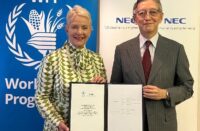 Following the increase in inflation rate, financial experts have said that the yields on short-tenored Treasury Bills and FGN Bonds may rise as temporary reaction to the increase.
Following the increase in inflation rate, financial experts have said that the yields on short-tenored Treasury Bills and FGN Bonds may rise as temporary reaction to the increase.
A report made available to our correspondent on Wednesday by FSDH Merchant Bank, however, stated that the yields were likely to drop next month.
It said, “The yields on short-tenored Treasury Bills and FGN Bonds may rise as temporary reaction to the increase in inflation rate. In our view, this will be short-lived as our projections point to a drop in inflation rate in March 2013.â€ÂÂ
The report added, “In the short term, the Central Bank of Nigeria will rely on open market operations to manage the liquidity in the system. The implication of this is that inter-bank rates and yields on fixed income securities at the secondary market will be influenced by the extent of liquidity in the system.â€ÂÂ
The Monetary Policy Committee, in its second meeting of the year, retained the Monetary Policy Rate at 12 per cent and maintained the symmetric corridor of +/-200 basis points around the MPR.
The committee also retained the Cash Reserve Ratio at 12 per cent; the Liquidity Ratio at 30 per cent and the Net Foreign Exchange Open Position at one per cent.
Meanwhile, the Governor, CBN, Mr. Lamido Sanusi, said he supported keeping the benchmark interest rate on hold to contain inflation.
Bloomberg quoted Sanusi on Tuesday as saying, “My own inclination is to just hold and just continue doing what we’re doing, because it has worked very well. But I’m only one vote in the MPC. However, the votes to ease are beginning to increase.â€ÂÂ
Sanusi stated that the impact of interest rates below inflation could be “horrendous†for economic stability.
He, however, said, “In the short term, the country has to live with high rates.â€ÂÂ
For a ninth meeting, the 12-member MPC, led by Sanusi, left the benchmark interest rate at a record high of 12 per cent to help bolster the naira and keep inflation below 10 per cent.
Three members voted for a reduction, up from two in January, to support the economy.
Inflation in Nigeria accelerated to 9.5 per cent in February from nine per cent in the previous month.
At the same time, the naira has dropped 1.3 per cent against the dollar this year, making imports more expensive.
Source: Punch (By Ademola Alawiye)






